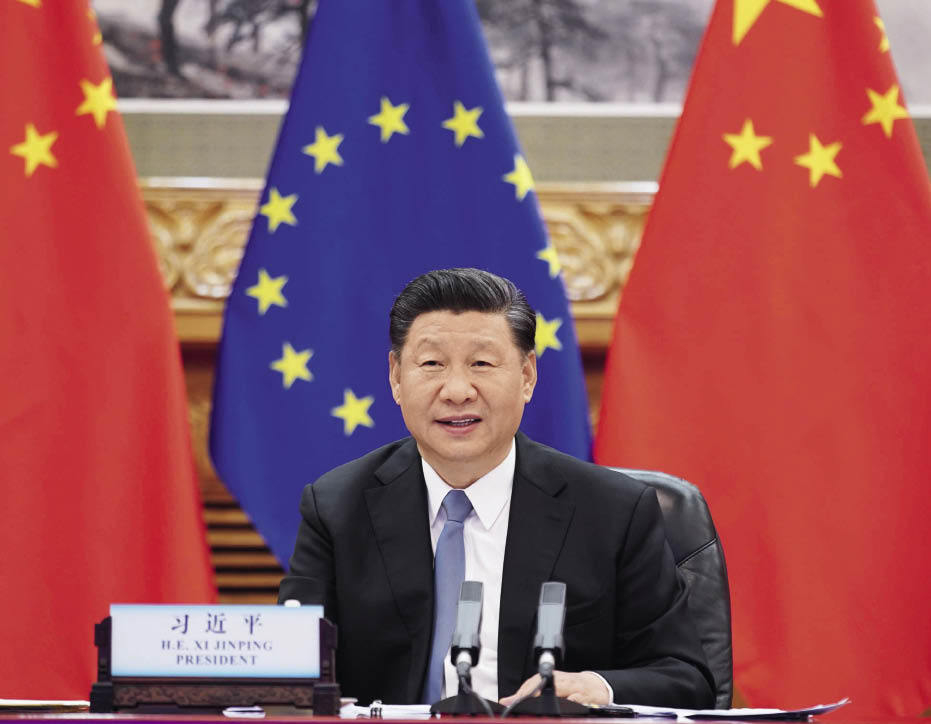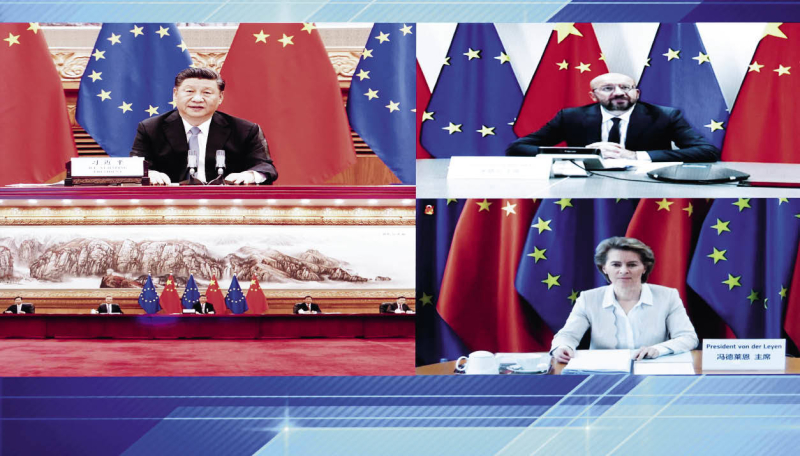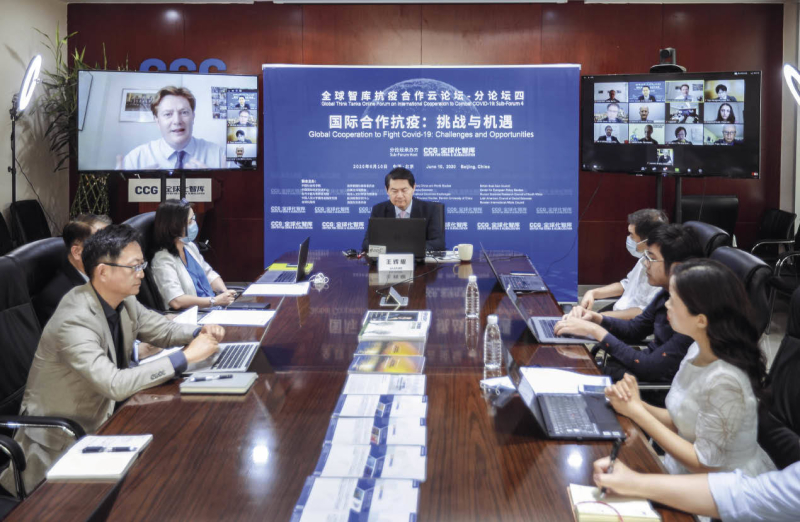
On June 22, Chinese President Xi Jinping speaks via video with President of the European Council Charles Michel and President of the European Commission Ursula von der Leyen.
In March, President Xi delivered a speech at the G20 Extraordinary Leaders’ Summit on COVID-19. In May, at the opening of the 73rd World Health Assembly, Xi delivered another speech via video link. In June, he presided over the Extraordinary China-Africa Summit on Solidarity against COVID-19 and delivered a keynote address. Furthermore, he delivered a written speech to the High-Level Video Conference on Belt and Road International Cooperation and sent a congratulatory letter to the China-Arab States Political Parties Dialogue Extraordinary Meeting. All these sent a clear signal that China upholds multilateralism and hopes to build a global community of health.
Fighting COVID-19, a Top Priority
COVID-19 is the most serious global pandemic that has affected mankind in a century. It is a big crisis and a severe test for the world, posing a threat to the safety and health of people of every country and a huge challenge to global public health security.
Faced with this unprecedented and sudden outbreak, the Chinese government has put its people’s safety and health first. The whole country had been mobilized, and precise and strict prevention and control measures implemented. Finally, with great efforts and a high price paid, China effectively contained the epidemic. But, risks still persist of a rebound.

On their first official meeting via video link on June 22, Chinese President Xi Jinping speaks with President of the European Council Charles Michel and President of the European Commission Ursula von der Leyen.
Other countries have also taken effective prevention and control measures based on their national conditions and achieved positive results. However, the epidemic continues to spread and wreak havoc around the world, making the situation very worrying. It is imperative for the world to make a tremendous effort in epidemic prevention and control.
With a global public health crisis of this magnitude, humanity is once again at a crossroads. Which route shall we take? Shall we uphold science and rationality, or shall we instigate political disputes? Strengthen unity and cooperation, or seek isolation? Promote multilateral coordination, or pursue unilateralism? Every country has a choice to make.
China believes that all countries should make the choice that is better for the interests of all humanity and the well-being of our future generations. Upholding the vision of a global community of shared future, we should support each other and join hands to contain the spread of the virus, and protect the health and well-being of people across the globe.
The international community needs to put people’s health first and take actions to deploy medical supplies and take effective measures in key areas such as prevention, quarantine, testing, treatment, etc. to prevent the virus from spreading.
Particularly as developing countries in Asia, Africa, Latin America, and other regions become plagued by the epidemic, their weaker public health systems are finding it difficult to cope with such severe challenges. Therefore, the international community should urgently work together and cooperate to help them enhance their epidemic prevention and control ability.
While for those who are keen to blame others, to politicize and stigmatize the epidemic, “build walls” or de-globalize, their actions should be firmly rejected by the international community.
Unswervingly Upholding Multilateralism
The virus knows no borders and the epidemic knows no race. Solidarity and cooperation are the most powerful weapons in the fight against the epidemic. This has been the important experience gained by the international community in the fight against major epidemics such as AIDS, Ebola, the avian flu, and H1N1. It is the right path for people of all countries to work together.
Whether it is to fight the spreading virus or the worsening global economic recession, all countries need to forge ahead bravely, help each other, and work together to build the tightest network of joint prevention and control, and show the great love that exists in the world. This aligns with what President Xi pointed out in his written address to the High-Level Video Conference on Belt and Road International Cooperation.
Since the outbreak of the epidemic, China has been practicing multilateralism, actively discussing with relevant parties the establishment of a regional public health emergency liaison mechanism, improving the response to public health emergencies, and establishing global and regional epidemic prevention materials reserve centers.

The sub-forum themed “Global Cooperation to Fight COVID-19: Challenges and Opportunities” under the Global Think Tanks Online Forum on International Cooperation to Combat COVID-19 is held in Beijing on June 10.
China has always attached great importance to enhancing communication and exchanges with the international community. The Communist Party of China has issued a joint appeal with 240 political parties from over 110 countries, and President Xi has spoken to or met with nearly 50 foreign leaders of state and heads of international organizations.
China has established an online knowledge center and an international cooperation experts bank and given full play to the Alliance of International Science Organizations in the Belt and Road Region in a bid to facilitate information sharing and drug, vaccine, and testing researches, striving for an early breakthrough to benefit all humankind. The National Health Commission (NHC) has worked out diagnosis, treatment, prevention, and control solutions, had them translated into three languages, and shared them with over 180 countries and a dozen international and regional organizations. Together with the WHO it held an international briefing via video link on China’s experience in COVID-19 control.
China calls on multilateral organizations, including the G20, APEC, BRICS, and SCO, to increase dialogue, exchanges, and policy coordination within their respective frameworks.
At the recent China-EU summit, President Xi called for the two sides to jointly promote global information and experience sharing and join in international cooperation against COVID-19. At the opening of the 73rd World Health Assembly video conference, President Xi solemnly pledged that the COVID-19 vaccine would be used as a global public product once it is developed and deployed in China.
At the Extraordinary China-Africa Summit on Solidarity against COVID-19, President Xi announced that within the framework of Forum on China-Africa Cooperation (FOCAC), China will write off the debt of relevant African countries in the form of interest-free government loans that are due to mature by the end of 2020. For those African countries that are hit hardest by the coronavirus and are under heavy financial stress, China will work with the global community to give them greater support by such means as further extending the period of debt suspension, to help them tide over the current difficulty. Chinese financial institutions are encouraged to respond to the G20’s Debt Service Suspension Initiative (DSSI) and to hold friendly consultations with African countries according to market principles to work out arrangements for commercial loans with sovereign guarantees. China will work with other members of the G20 to implement the DSSI and, on this basis, urge the G20 to further extend debt suspension for countries concerned, including those in Africa.
All these concrete measures are taken in an open manner. China opposes racial discrimination and ideological bias, firmly upholds international fairness and justice, and provides a framework for promoting international cooperation on joint prevention and control.
Improving the Global Public Health Governance System
The COVID-19 pandemic has exposed many weaknesses and deficiencies in the global public health governance system, and a global joint prevention and control mechanism for infectious diseases is needed. In order to better meet the challenges posed by large-scale infectious diseases in the future, these weaknesses and deficiencies need to be addressed and improved urgently.
China therefore calls on the international community to draw lessons from this pandemic, reflect seriouly, and turn crises into opportunities. Countries should show extraordinary political vision and a strong sense of responsibility by doing the following:
• Embrace a philosophy that puts life above everything else, regard the world as a whole, and stress equality, mutual respect, cooperation, and mutual assistance;
• Establish sound mechanisms for international cooperation, including a long-term financing mechanism, a monitoring, early warning, and joint response mechanism for threats to public health, and a mechanism for reserving and allocating resources;
• Create an efficient, sustainable global public health system for all;
• Fortify defenses for the lives and health of all; and
• Build a global community of health for all.
To achieve this goal, we need to give full play to the unique and important role of international and regional organizations in the global public health governance system.
At the opening of the 73rd World Health Assembly video conference and the Extraordinary China-Africa Summit on Solidarity against COVID-19, President Xi announced that China will cooperate with the UN to set up a global humanitarian emergency warehouse and hub in China, make efforts to ensure the supply chain of anti-epidemic materials, and establish green channels for their transportation and customs clearance. China is ready to work with Africa to uphold the global governance system with the UN at its core, support the WHO in making greater contribution to the global fight against COVID-19, and call on the international community to increase political support and financial input for the WHO.
China supports efforts by the WHO to make a full, objective, impartial, scientific, and professional assessment of the global response once the pandemic has been brought under control and to improve the global governance system for public health security.
China has provided US $50 million to the WHO, and helped its COVID-19 Solidarity Response Fund to raise funds in China. It has also participated in the WHO’s “Access to COVID-19 Tools (Act) Accelerator” initiative, aiming to speed up the development, production, and equitable distribution of new tools.
At the G20 Extraordinary Leaders’ Summit on COVID-19, China proposed to convene a meeting of the group’s health ministers to enhance information sharing. It proposed that the group formulate an action plan and make timely and necessary institutional communication and arrangements for macro-policy coordination against COVID-19. It also advocated to give play to the group’s communication and coordination role, strengthen exchanges, and hold high-level meetings on global public health security at an appropriate time.
In a message of sympathy and support to EU leaders on the COVID-19 epidemic, President Xi said that China, in keeping with the vision of a community with a shared future for humankind, is ready to strengthen coordination and cooperation with the EU at bilateral and international levels to jointly safeguard global and regional public health security and protect the lives and health of people on both sides and around the world.
At the Special ASEAN Plus Three Summit on COVID-19, China announced that it supports ASEAN in setting up a special fund to fight the disease, and would provide necessary support through the ASEAN-China Investment Cooperation Fund and the 10+3 Cooperation Fund. It suggested to establish a 10+3 emergency medical supplies reserve center, based on the current situation and with a long-term perspective, to improve response efficiency and strengthen material support.
As President Xi stressed when he met with EU leaders, the world under the impact of the pandemic is undergoing profound changes and is facing greater uncertainties. We should strive to find new opportunities in the midst of the crisis and break new ground in the midst of changes. China and the EU should pursue multilateralism and improve global governance. No matter how the international situation changes, China will stand by multilateralism and adhere to the concept of global governance based on extensive consultation, joint contribution, and shared benefits. China appreciates the EU’s firm commitment to multilateralism, participates in international cooperation against COVID-19, and increases investment in the WHO and other international institutions. China is ready to strengthen coordination and cooperation with the EU on major international and regional issues, to strengthen dialogue and cooperation on global public health governance, and to build a global community of health. As long as we work together and help each other in times of difficulty, we will be able to defeat the epidemic and usher in an even better future for humankind.
_______________
GAO ZUGUI is vice president and professor at the Institute for International Strategies of National Academy of Governance.